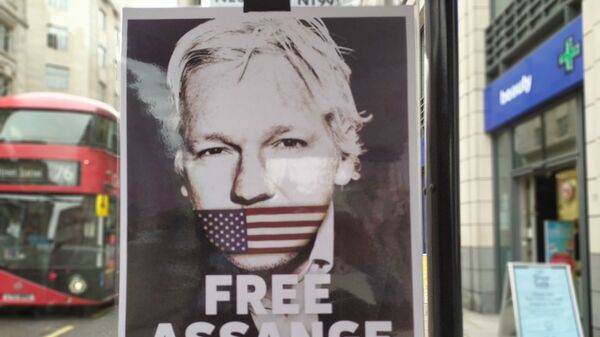Professor Paul Rogers, emeritus professor of Peace Studies at Bradford University, told the court at the Old Bailey on Wednesday that WikiLeaks publisher Julian Assange has strong political views and that his prosecution does appear to be politically motivated.
The political scientist, who specialises in international security, concluded that Mr Assange has very clear political opinions - and that the clash of those views with successive US administrations, especially the current one, suggests that he is regarded primarily as a political opponent who must experience the "full wrath of government".
Professor Roberts told the court that:
"This does appear to be a political trial for many reasons of course – the return to political motivation is a political high level… an unusual level for most Western governments. Atypical of American and Western administrations for many years."
He noted that President Donald Trump "appears to take considerable antipathy to President Obama and what he did during his administration" and that it was "reasonable to assume that that is one reason the current admin might take a different stance to to the Obama administration."
The professor said that Assange has "very clear" political views which do not align with mainstream political views but are of a more "libertarian" nature that is "very clear cut". It is a wider political view than merely publishing US classified documents as WikiLeaks have also published documents connected to trade unions, NGOs and corporations, the professor explained. Professor Roberts emphasised the fact that the failure to prosecute Mr Assange by the Obama administration followed by the decision to prosecute by the Trump administration weighed strongly in favour of the idea that the prosecution was politically motivated, though that is not the only factor in his assessment.
Professor Roberts also contextualised the prosecution noting that WikiLeaks documents exposed many fallacies about the wars in Afghanistan and Iraq as well as revealing a truer picture of the extent of war crimes and civilian casualties.
Prof Rogers: In the case of Afghanistan and in particular Iraq the US had a very strong commitment to going to war… and the belief was that the early success in terminating the Taliban regime was that the US had “gone back on track as a state”.
— Mohamed Elmaazi (@MElmaazi) September 9, 2020
WikiLeaks revelations exposed “the fiction of success” revealing that Afghanistan was not really “under control” confirming the view of some analysts that the war had gone wrong from the start. Evidence published by WikiLeaks confirmed this to a degree of...
— Mohamed Elmaazi (@MElmaazi) September 9, 2020
...detail that was not previously available.
— Mohamed Elmaazi (@MElmaazi) September 9, 2020
In the case of Iraq WikiLeaks documents also confirmed why and how the war had gone so badly wrong from the perspective of the United States. Including an appreciation of the number of civilians killed "maybe possibly the most...
...important part" the information WikiLeaks provided from the Iraq War logs was an additional 15,000 killed on top of that recorded by Iraq Body Count. The shift in public knowledge has been brought about in significant part via unauthorised disclosures.
— Mohamed Elmaazi (@MElmaazi) September 9, 2020
James Lewis QC, acting for the US government, pressed Professor Roberts as to why the professor had not included the arguments put forward by the US attorneys which set out their legal arguments in support of the indictment. Mr Lewis suggested that an unbiased expert would assist the court by addressing all of the evidence.
As with Professor Mark Feldstein on Day 2, Lewis sought to contest whether Rogers was an "unbiased" expert. He objected to the fact that prosecutorial affidavits in the case were left out of his testimony. And questions became rather maddening for Rogers. #Assange
— Kevin Gosztola (@kgosztola) September 9, 2020
Mr Roberts responded that he was looking at the wider political context of the prosecution and was happy to discuss the arguments posed by the government but "took it as read" that the US government had legal arguments further to their prosecution.
Mr Lewis also asked whether Professor Roberts had seen the evidence against Mr Assange. The Professor had originally signalled that he had but later clarified, upon being challenged by Mr Lewis, that he thought the prosecution was referring to the indictment and supporting documents rather than the evidence itself.
Rogers clarified that, of course, he had not seen evidence the United States is "reserving for its own hearing."
— Kevin Gosztola (@kgosztola) September 9, 2020
And that he didn't know how strong the evidence is, but who does? Because it isn't public. #Assange
The cross-examination ultimately ended with Mr Lewis putting it to Professor Roberts that he was "giving a biased opinion in defence of Mr Assange" which the witness strongly objected to, suggesting that there were interpretations of his testimony which he strongly contested.
Mr Assange remains incarcerated in the Belmarsh maximum-security prison on pre-trial detention, despite completing his sentence for absconding while on bail when he sought and obtained asylum at the Ecuadorian embassy. He faces up to 175 years in prison if he is convicted on all 18 charges currently levied against him.
Sputnik has been granted access to monitor the hearings via a live video feed and will continue to report on the case and the goings on outside of the court building as the extradition hearings develop.




